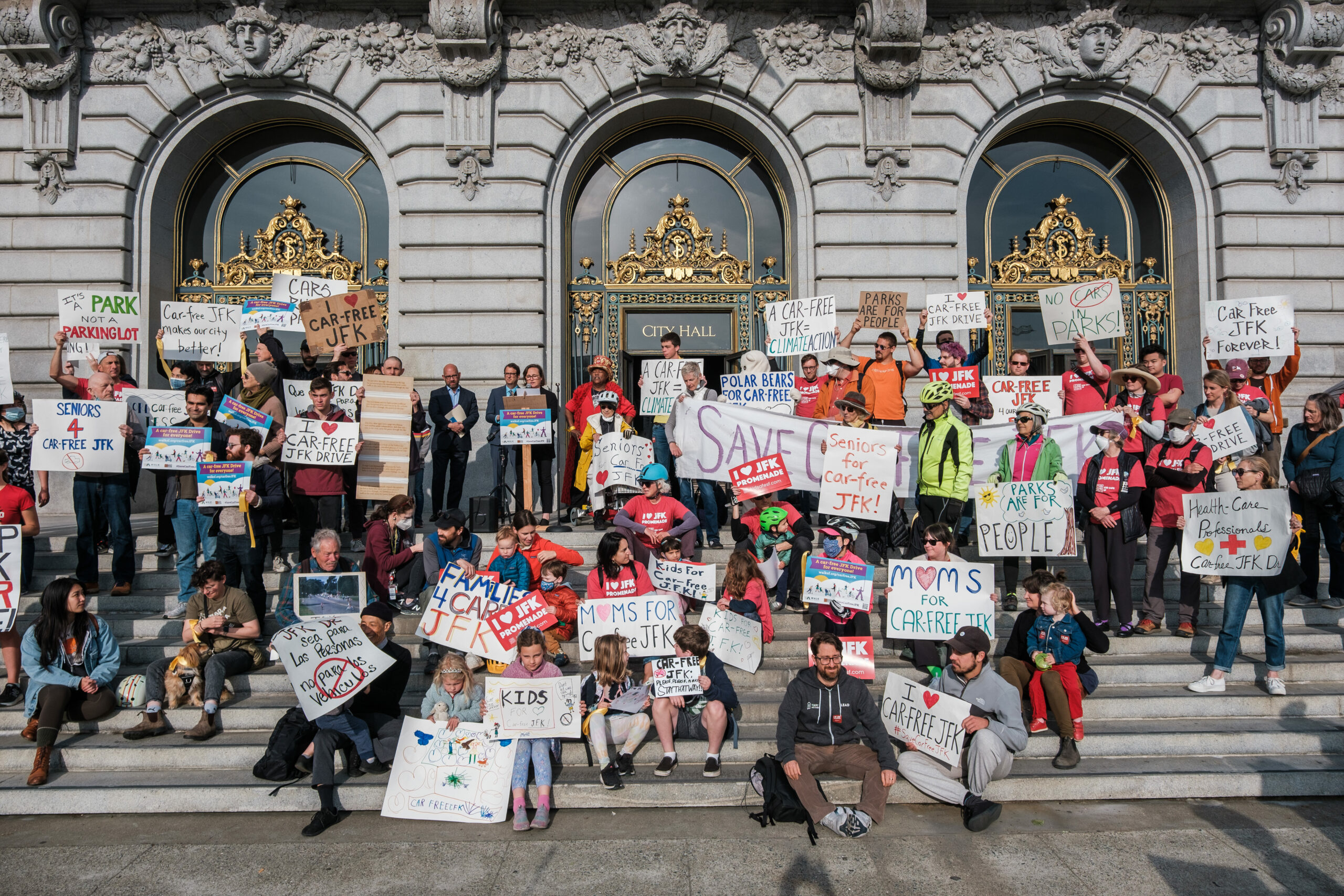The fate of John F. Kennedy Drive hangs in the balance Tuesday, as supervisors and transit officials hold a joint hearing to decide if the 1.5-mile road in Golden Gate Park should remain closed to vehicles. Here’s what you need to know:
How did this all start?
The city agreed to close the 1.5-mile road in Golden Gate Park on Sundays back in 1967. Since that time, families, safe streets advocates and roller skaters—do yourself a favor and watch this glorious video of Skate Patrol—have been pushing to expand car-free days to some holidays and occasional Saturdays. During the beginning of the pandemic, the city closed JFK Drive and the Great Highway to car traffic to encourage residents to socialize safely outside.
Who cares about JFK Drive?
Actually, a lot of people. Groups like Walk SF, Kid Safe SF and the San Francisco Bicycle Coalition have hosted rallies and raised tens of thousands of dollars to keep the road closed to cars. Meanwhile, the nonprofit arm of the de Young Museum, which is adjacent to JFK Drive, spent roughly $133,000 as of early April to lobby city officials and buy ads calling for the road’s reopening. The museum’s argument is that the road’s closure denies access to seniors and the disabled, and it has slowed a recovery in attendance to the fine arts museum.
So what’s happening today?
The Board of Supervisors and San Francisco County Transportation Authority are holding a joint hearing Tuesday, and it’s not clear how the vote will go. Mayor London Breed has the support of Supervisor Matt Haney, who until next week remains an assemblyember-elect, but most of the supervisors have been cagey. Supervisor Connie Chan’s proposal is co-sponsored by Board President Shamann Walton, who has been strident in his opposition to the road’s closure, calling it “recreational redlining.” Supervisor Ahsha Safaí previously tweeted his desire to reopen the road.
Supervisor Hillary Ronen’s staff previously told The Standard she planned to support the mayor’s bill, but the supe was scheduled to speak with Chan’s office Monday to finalize her position. Supervisors Aaron Peskin, Gordon Mar, Catherine Stefani and Myrna Melgar did not immediately respond to requests for comment.
Have any experts weighed in?
Tuesday’s hearing will include an equity study on JFK Drive, which surveyed around 750 San Francisco residents to evaluate access challenges, including from some of the city’s furthermost neighborhoods from the park. The study found that the cost and availability of parking were the biggest barriers to Golden Gate Park for residents coming from Districts 3, 10 and 11. Before the pandemic, fewer than half of the respondents from those districts were regularly using the park. While the study did not give a policy recommendation, it did credit Breed’s proposal for addressing travel barriers while raising concerns that Chan’s does not adequately plan for drop-off and loading areas at the Music Concourse, the central hub for the park’s museums. The San Francisco Recreation and Park Department and the San Francisco Municipal Transportation Agency officials previously recommended that JFK Drive should remain car-free after “extensive public outreach and study.”
Will anyone end up happy?
Probably not. Both the mayor and Chan have repeatedly said they want to find a compromise, but advocates for both sides have dug in to their positions. Seniors have rallied to reopen the road, calling the closure “ageist.” Supervisor Walton has called the closure racist. The de Young Museum is hemorrhaging cash and looking for anything to blame, including a small stretch of road. Meanwhile, parents who live near the park have said the closure was “one of the best things that ever happened for our children.” The rhetoric may be too inflamed for either side to feel good about not getting exactly what they want. The elected officials who cross parents and safe streets advocates will likely face a substantial amount of heat in the months to come if they reopen the road to cars.
